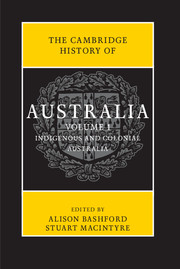Book contents
- Frontmatter
- Contents
- Abbreviations
- List of maps
- List of figures
- List of tables
- Notes on contributors
- Map
- Preface
- Introduction
- PART I
- PART II
- Further reading
- Chronology
- Index
- Frontmatter
- Contents
- Abbreviations
- List of maps
- List of figures
- List of tables
- Notes on contributors
- Map
- Preface
- Introduction
- PART I
- 1 Nation building, 1901–14
- 2 The Great War and its aftermath, 1914–22
- 3 Search for a solution, 1923–39
- 4 World War 2 and post-war reconstruction, 1939–49
- 5 The Menzies era, 1950–66
- 6 Instability, 1966–82
- 7 Growth resumed, 1983–2000
- 8 The new millennium
- PART II
- Further reading
- Chronology
- Index
2 - The Great War and its aftermath, 1914–22
from PART I
Published online by Cambridge University Press: 05 November 2013
- Frontmatter
- Contents
- Abbreviations
- List of maps
- List of figures
- List of tables
- Notes on contributors
- Map
- Preface
- Introduction
- PART I
- PART II
- Further reading
- Chronology
- Index
- Frontmatter
- Contents
- Abbreviations
- List of maps
- List of figures
- List of tables
- Notes on contributors
- Map
- Preface
- Introduction
- PART I
- 1 Nation building, 1901–14
- 2 The Great War and its aftermath, 1914–22
- 3 Search for a solution, 1923–39
- 4 World War 2 and post-war reconstruction, 1939–49
- 5 The Menzies era, 1950–66
- 6 Instability, 1966–82
- 7 Growth resumed, 1983–2000
- 8 The new millennium
- PART II
- Further reading
- Chronology
- Index
Summary
On 31 July 1914, four days before Britain entered World War 1, Andrew Fisher, son of a Scottish coalminer and sober, autodidact leader of the Australian Labor Party (ALP), sensing the profound shift to come in the tide of world affairs, pledged Australia's support for Britain's war effort down to ‘the last man and the last shilling’. Such sentiments echoed around the British Empire, particularly in its Dominions. The widely read Prairie novelist C.W. Gordon, for example, proclaimed that Canada would commit ‘her last man and her last dollar’. Britain, however, did not need to consult Dominion governments before declaring war on Germany: it was assumed that Britain's declaration spoke for all the Dominions. Yet at the peace conference in 1919, Britain's settler Dominions – Australia, Canada, New Zealand and South Africa – insisted on signing the Treaty of Versailles in their own right, demanding their own conditions and in some instances becoming minor imperial powers themselves.
The Canadian historian J.M.S. Careless has termed this new sense of hard-won independence ‘dominion nationalism’. Before the war the Dominions had commonly seen themselves as settlements of Britons overseas; with the exception of Afrikaners and Québécois, they were tied self-consciously by a ‘crimson thread of kinship’ to their homeland. The experience of the Great War convinced many in the Dominions that they were different in temperament, dialect and culture from the British. Moreover, they thought the bravery of Dominion soldiers and the enormous losses they bore attested to independent nations that had earned the right to strut the world stage on their own terms. They might have remained part of the Empire but by war's end they were no longer settlements within an Empire but nations agreeing to be part of it.
The new status was born in the most terrible of circumstances. Of the 324,000 men who served overseas, 60,000 died there, while 150,000 returned wounded, ill or psychologically scarred, a casualty rate of nearly two-thirds, higher than that of any other Allied force.
- Type
- Chapter
- Information
- The Cambridge History of Australia , pp. 39 - 63Publisher: Cambridge University PressPrint publication year: 2013
- 4
- Cited by



